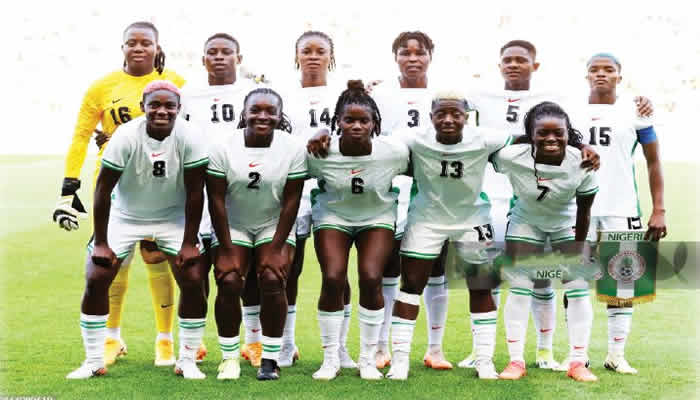The Nigerian women’s national football team, the Super Falcons, finds itself in a precarious position just months before the 2024 Women’s Africa Cup of Nations (WAFCON). Despite being the 11-time African champions and ranked number one on the continent, the team’s inactivity and lack of preparation have raised serious concerns among fans and analysts. The second international break of 2025, running from March 31st to April 8th, presented a crucial opportunity for the team to regroup, strategize, and fine-tune their preparations. However, this valuable window has passed without any organized activities for the Super Falcons, highlighting a concerning lack of planning and urgency from the Nigeria Football Federation (NFF). This inactivity contrasts sharply with the preparations of other African nations gearing up for future tournaments, including Ivory Coast and Kenya, who scheduled friendly matches during the same international break.
The Super Falcons’ last competitive outing was a friendly against France in November 2024, followed by a two-legged friendly against Algeria in October 2024. Since then, despite the WAFCON draw placing Nigeria in Group B alongside Tunisia, Algeria, and Botswana, the team has been dormant. This lack of activity is particularly puzzling given that the draw took place eight months before the tournament, providing ample time for the NFF to arrange preparatory matches and training camps. The NFF president, Ibrahim Gusau, had promised adequate preparations and friendly games in December 2024, aiming to blend the old and new players into a formidable squad. However, these promises have yet to materialize, leaving the team’s preparedness in question.
The concern surrounding the Super Falcons’ inactivity is amplified by the rising competition in African women’s football. Other nations are investing heavily in their women’s teams, closing the gap on Nigeria’s traditional dominance. The team’s failure to utilize the international breaks for training and friendly matches puts them at a significant disadvantage, potentially jeopardizing their chances of reclaiming the African title. Fans and analysts have voiced their frustrations, criticizing the NFF’s lack of organization and foresight. They point to other nations’ proactive preparations as a stark contrast to Nigeria’s complacency, urging the NFF to take immediate action to rectify the situation. The sentiment shared among fans is that anything less than a stellar performance at the WAFCON will be unacceptable, given the team’s pedigree and potential.
Adding to the anxieties surrounding the Super Falcons is the unfortunate parallel with the Nigerian U-17 men’s team, the Golden Eaglets. Similar negligence in preparation and planning led to the Eaglets missing two consecutive FIFA U-17 World Cups. This precedent underscores the systemic issues within Nigerian football administration, highlighting a concerning pattern of inadequate planning and a lack of urgency in preparing national teams for major tournaments. Critics argue that while other footballing nations are progressing, Nigeria appears to be regressing under the current administration, jeopardizing the future of both men’s and women’s football in the country. The lack of competitive matches deprives the team of crucial opportunities to build chemistry, implement tactical strategies, and assess player form. This lack of game time could prove detrimental when the tournament begins, leaving the Super Falcons struggling to find their rhythm and cohesion against well-prepared opponents.
While the Super Falcons boast a roster of talented players, including established stars like Asisat Oshoala and rising talents like Gift Monday, individual brilliance alone may not be enough to compensate for the lack of collective preparation. Both Oshoala and Monday have emphasized the importance of adequate preparation, acknowledging that talent must be complemented by rigorous training and friendly matches to achieve success at the highest level. Their calls for better preparation underscore the players’ awareness of the challenges posed by the team’s current situation. They understand that without adequate opportunities to play together and refine their strategies, their chances of reclaiming the African crown are significantly diminished.
The 2022 WAFCON served as a stark reminder of the shifting landscape in African women’s football. The Super Falcons, under coach Randy Waldrum, finished a disappointing fourth, suffering defeats to both South Africa and Zambia. This outcome exposed vulnerabilities within the team and highlighted the importance of thorough preparation. With the 2024 WAFCON looming, the NFF must act swiftly to address the team’s current predicament. The next international break, scheduled for May 26th to June 3rd, presents a final opportunity to salvage the situation. The NFF must utilize this window to organize high-quality friendly matches against strong opponents, providing the team with much-needed game time and allowing the coaching staff to assess player combinations and tactical approaches. Failure to act decisively during this final window could have serious repercussions for the Super Falcons’ performance at the WAFCON, potentially jeopardizing their aspirations of reclaiming their continental dominance.













